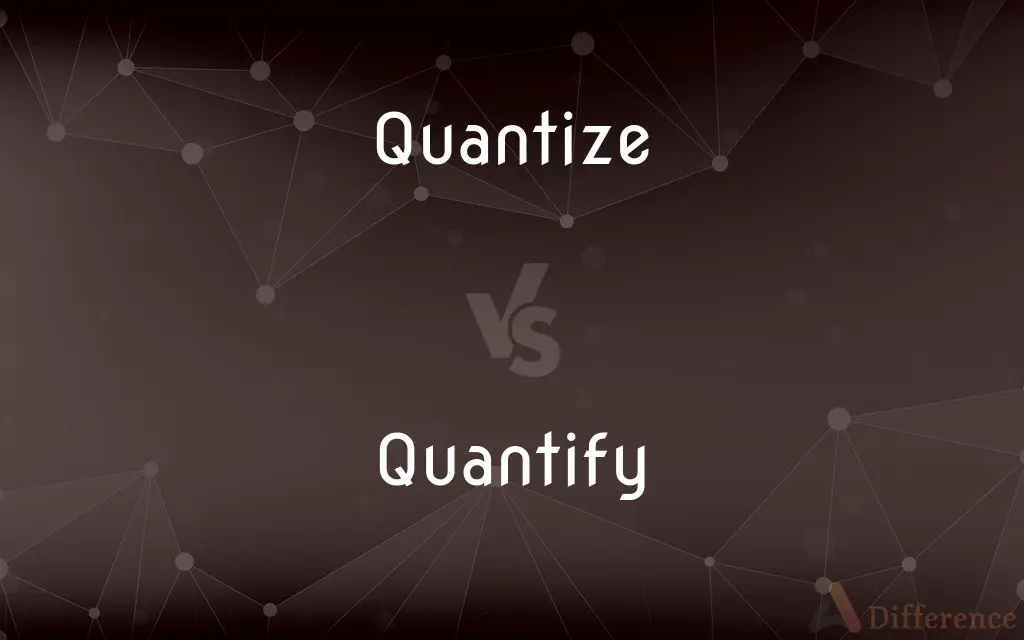Quantize vs. Quantify — What's the Difference?
Edited by Tayyaba Rehman — By Maham Liaqat — Updated on April 5, 2024
Quantize refers to the process of approximating continuous values into discrete states, while quantify means to measure or express the quantity of something.

Difference Between Quantize and Quantify
Table of Contents
ADVERTISEMENT
Key Differences
Quantize is a term often used in digital signal processing, where it describes the process of mapping a large set of input values to a smaller set, such as converting an analog signal into a digital one. This involves approximating values to make them representable in digital form. On the other hand, quantify involves determining, measuring, or expressing the size, amount, or degree of something in numerical terms, without necessarily changing the nature of what is being measured.
When you quantize something, you're essentially breaking down a continuous range into finite steps or "buckets," each representing a range of values. This is crucial in various fields like physics, computing, and digital audio, where it allows for the representation and manipulation of real-world phenomena in a digital or discrete framework. Whereas, quantifying can apply to virtually any measurable attribute, from physical dimensions and quantities to abstract concepts like happiness or efficiency, without altering the original nature of the attribute.
The goal of quantization is to reduce the complexity of a signal or data, making it manageable for digital processing, storage, or transmission. This reduction inevitably leads to some loss of information, known as quantization error. Quantify, in contrast, aims to provide a clear, numerical expression of characteristics or quantities, enhancing understanding and comparison without implying a reduction or approximation of the original data.
Quantization is critical in fields like digital audio production, where sounds are converted from analog waves to digital signals that computers can manipulate. Each sound wave is divided into discrete steps of amplitude, enabling digital storage and editing. On the other hand, quantification is used in research and analysis across disciplines, such as quantifying the population growth in ecology or measuring concentrations of substances in chemistry, to establish facts and make informed decisions.
While quantize focuses on the approximation and representation of continuous data in discrete, manageable forms for digital applications, quantify concerns itself with the measurement and expression of quantities, aiming for accuracy and specificity without altering the essence or format of what is being measured.
ADVERTISEMENT
Comparison Chart
Definition
Approximating continuous values into discrete states.
Measuring or expressing the quantity of something.
Purpose
To make continuous data manageable for digital processing.
To establish numerical expressions of size, amount, or degree.
Field of Use
Digital signal processing, computing, digital audio.
Research, analysis, various scientific disciplines.
Outcome
Discrete representation of data, with potential information loss.
Numerical expression of an attribute, without altering its nature.
Key Consideration
Minimizing quantization error.
Accuracy and specificity in measurement.
Compare with Definitions
Quantize
To approximate continuous signals into discrete values for digital representation.
Quantizing audio signals allows them to be stored in digital formats.
Quantify
Assigning numerical values to observations.
Psychologists quantify stress levels using various scales.
Quantize
The process of dividing a continuous range into discrete intervals.
In digital imaging, color quantization reduces the number of colors used in an image.
Quantify
To measure or express the amount of something in numerical terms.
Researchers quantify the chemical’s concentration in water samples.
Quantize
Converting analog signals into a digital format.
The microphone quantizes sounds for digital recording.
Quantify
The act of determining the size or extent of something.
The study aims to quantify the impact of deforestation.
Quantize
The action of mapping a large set of values to a smaller one.
Quantizing temperature readings for a digital display.
Quantify
Calculating or expressing the quantity of a substance or material.
Engineers quantify the amount of materials needed for construction.
Quantize
In quantum physics, to apply the principles of quantum mechanics.
Quantizing the energy levels of an electron around an atom.
Quantify
Estimating the numerical aspect of an attribute or phenomenon.
Economists quantify the effects of fiscal policies on inflation.
Quantize
To limit the possible values of (a magnitude or quantity) to a discrete set of values by quantum mechanical rules.
Quantify
To determine or express the quantity of.
Quantize
To apply quantum mechanics or the quantum theory to.
Quantify
(Logic) To limit the variables of (a proposition) by prefixing an operator such as all or some.
Quantize
To limit the number of possible values of a quantity, or states of a system, by applying the rules of quantum mechanics
Quantify
To assign a quantity to.
Quantize
To approximate a continuously varying signal by one whose amplitude can only have a set of discrete values
Quantify
To determine the value of (a variable or expression).
Quantize
To shift each beat in a rhythmic pattern to the nearest beat of a given resolution (eighth note, sixteenth note, etc.), or to adjust the frequency or pitch of a note to the nearest perfect tone in a given musical scale
Quantify
(logic) To relate a statement (called a predicate) to a given set using a quantifier—either for all (denoted ∀) or there exists (denoted ∃).
The statement quantifies over the real numbers.
Quantize
To associate a given set of numbers with a set of numeric values in another encoding or numerical system (e.g. in a discrete mathematics).
Quantify
To modify or qualify with respect to quantity; to determine, fix or express the quantity of; to rate.
Quantize
Telecommunications: approximate (a signal varying continuously in amplitude) by one whose amplitude is restricted to a prescribed set of discrete values
Quantify
To make explicit the quantity of; as, to quantify a variable.
Quantize
Apply quantum theory to; restrict the number of possible values of (a quantity) or states of (a physical entity or system) so that certain variables can assume only certain discrete magnitudes that are integral multiples of a common factor;
Quantize gravity
Quantify
Use as a quantifier
Quantify
Express as a number or measure or quantity;
Can you quantify your results?
Common Curiosities
Is quantization only applicable to digital data?
Quantization is primarily associated with converting analog to digital data, but the concept can also apply to categorizing continuous phenomena into discrete states in various fields.
Can quantization occur without loss of information?
Almost all quantization processes involve some loss of information due to the approximation of values, though it's often minimal and acceptable.
Why is quantization necessary in digital processing?
Quantization is necessary to represent continuous real-world data in a digital format that computers can process, store, and transmit.
Does quantization always result in a loss of quality?
In digital media, quantization can lead to a loss of quality, but careful control of the process can minimize perceptible effects.
Can quantifying help in improving processes or products?
Yes, by providing precise measurements, quantifying can help identify areas for improvement, track progress, and ensure quality control.
How do quantization and quantification impact decision-making?
Both provide numerical data that can inform decisions, with quantization facilitating digital processing and analysis, and quantification offering precise measurements for evaluation.
How does quantifying differ from simply measuring?
Quantifying involves not only measuring but also expressing the measurement in numerical terms, often with a focus on precision and context.
Can anything be quantified?
Most attributes can be quantified, either directly or indirectly, though the method and accuracy of quantification can vary widely depending on the nature of what's being measured.
Is quantization reversible?
Quantization is not perfectly reversible because some original data is lost in the approximation process, making exact reconstruction impossible in most cases.
How does one choose the level of quantization?
The level of quantization is chosen based on the balance between the desired accuracy and the practical limitations of storage, processing power, and bandwidth.
Share Your Discovery

Previous Comparison
Film vs. Drama
Next Comparison
Courtesy vs. ConsiderationAuthor Spotlight
Written by
Maham LiaqatEdited by
Tayyaba RehmanTayyaba Rehman is a distinguished writer, currently serving as a primary contributor to askdifference.com. As a researcher in semantics and etymology, Tayyaba's passion for the complexity of languages and their distinctions has found a perfect home on the platform. Tayyaba delves into the intricacies of language, distinguishing between commonly confused words and phrases, thereby providing clarity for readers worldwide.
















































